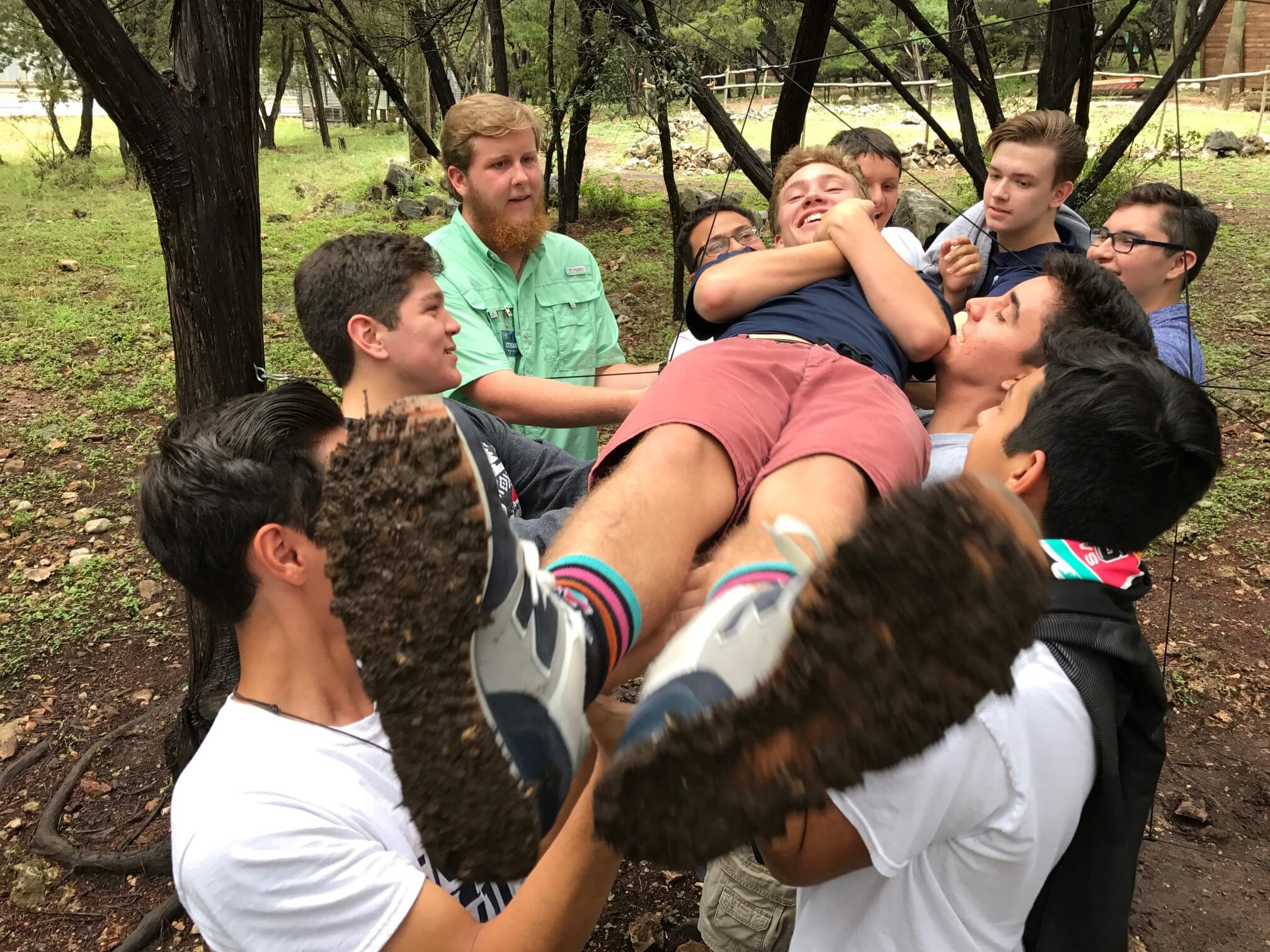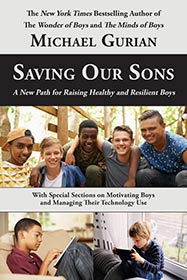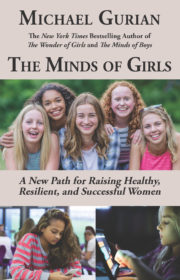You may have recently seen media stories showing the significant majority of Covid deaths and severe illness are male (e.g. https://www.cidrap.umn.edu/news-perspective/2020/04/studies-find-men-more-prone-covid-19-death). This is true not just among men but also boys (https://www.theguardian.com/society/2020/may/16/uk-lockdown-causing-serious-mental-illness-in-first-time-patients, https://www.fatherly.com/health-science/boys-severe-coronavirus-symptoms/). In our own Gurian Institute educational network, we are hearing how much more trouble boys are having than girls, on average, with academic motivation and achievement during Covid distance learning.
In a previous essay (May 6, 2020, Should Schools and Families Lock Down Again Due to Covid?), I argued that our Covid “science,” both publicly and politically, must now include as much social and economic science as single-thread epidemiology, because the science we see headlined on TV, the Internet, and social media constitutes only a small percentage of available data regarding Covid. Your reactions to this previous blog have been mainly positive and practical both in agreement and, in one case, opposition. Your responses have inspired this blog today, which will be as much essay as blog because a number of your questions coalesced around, “Are you willing to write about how hard the Covid crisis is hitting boys and men?” and “Is the answer to ‘What is a Man?’ different during a crisis than in another time?”
Over the last few months, as I’ve studied the sex-specific data coming in worldwide, I have thought about both these questions. Covid hits girls and women hard, too; there is no competition of suffering during a crisis or at any other time. I am the father of two grown daughters, have advocated for girls for decades and counseled hundreds of girls and women in my private practice The Minds of Girls, my latest book on female development, pleads with our culture to pay necessary attention to the stress and desperation many of our daughters feel today.
At the same time, statistics during our Covid crisis act as mirror and metaphor of life before Covid and after: boys and men are struggling, hurting, and failing to thrive. Each new cultural moment provides opportunity for us to open our eyes and hearts to what males need from a culture. Part of what they need lies in answering questions about 1) why we do not notice male pain as well as female and 2) what we want boyhood and manhood to be in our present age. Perhaps the Covid crisis is indeed a time, as some of you hinted in your emails, to realize, we cannot care well for women and girls by denying what boys and men need from us all.
Questions of Boyhood During Covid
Candice, 44, a mother of three sons, shared her thoughts with me about the Covid lockdowns, then she asked a series of questions.
“We are hearing these days that there is no ‘male’ and ‘female’ anyway, so what would we mean by ‘boy’?
“What role should we be giving boys, and should it be different during Covid than it was before?
“What is a man? Should manhood be different during Covid? Should ‘manhood’ even exist?
“How will our boys be changed by the Covid virus and lockdowns? Will they have PTSD? Will they be more mature than boys in other generations?
“Do you think the numbers of males dying, getting sick, and becoming unemployed will get people to understand how desperate things are for them today?”
Candice, like other moms of sons who write me, acknowledged that there are certainly ways our society is paying attention to boys’ needs, but she also expressed disappointment with one of the most popular ways. “If I hear one more time that boys’ issues will be solved when they talk to me more about what they feel, I am going to scream out loud.” Not an emotion-denier, Candice was, nonetheless, hoping we would go deeper into male life; yet she is wise to hint at this issue our boys and men do bring to the table, the issue of “social emotional ability,” “verbal-emotive ability,” “emotional self-disclosure.” In the words of Warren Farrell, author of The Boy Crisis, “Women cannot hear what men don’t say.”
Generally, in the past, and even now during Covid, there is suffering around us everywhere, but we don’t hear too many boys and men sharing their own male suffering, male death, sex- and gender-specific male issues. In Saving Our Sons, you’ll find science behind both the neural and social reasons for the tendency of males not to verbally share pain as much as girls and women do. Mothers of sons like Candice (thankfully) do some of that talking for them; these moms and parents love their sons and their men and want to plumb the depths of what it is to be male so that they can empathize, protect, enrich, and love males deeply.
Candice, like every parent of sons, knows that boys love us as much as we love them, in their own eccentric, boy-specific ways. Their love is the beauty of boyhood. Yet because boys are not (especially in pre-puberty and beyond), as adept at discussing their hidden feelings as their sisters, we may think males are closed off, withdrawn, or on the other hand, too-angry, aggressive, intimidating; because males often exclude us from intimately sharing their ascents and descents, their quests, their interior ideas, we mistake them, often, as dominant or unfathomable or, more subtle, grimly unworthy of our positive attention to their needs.
In his poem “My Father’s Wedding, 1924,” translator, essayist, and poet Robert Bly who is just recently deceased, wrote this powerful line about his father: “Since he never asked for pity, friends thought he was whole.” Males often do not ask us for sympathy and we, just as often, assume them, thus, to be whole. When we ask our sons why they do not share their full, mysterious selves with us, they’ll often answer honestly, “I don’t know.” Indeed, most males do not process enough of every detail of life to share it, except by motivating themselves with the details that are important to action. Their lack of self-knowledge, or sharing, has led to our cultural assessment that boys and men do not need us like girls and women do, a false idea that is one of the most dangerous of our age.
What is a Boy?
“What is a boy?” Candice asked, a question to be answered as much individually as culturally. Having myself been a boy for so many years, I see a “boy” as very much like outer space, sometimes lit well and sometimes dark and unlit but to the exploring, even timorous astronaut, vastly welcoming. Our boys are male and in being male attach themselves to the world and detach from it like both space and spaceship, void and astronaut, matter and energy. Boys are not one thing; they hope to explore everything.
When we take the hand of the boy and enter the parts of his internal world he can show us, we notice the unique ways our males embrace us–as both a mirror of who we are, and an invitation to enter with them into the explicitly male journey of both intimate freedom and moral vision. If we will take their hands in the ways they provide those hands, boys and men protect us, gift joy to us, test us, challenge us, sacrifice themselves for us, embrace us so that we, too, can be free like they wish to be.
Our boys have various liberties today, but do they have freedom? Are they independent, resilient, empathic beings as much as we wish they were? Perhaps boys raised during Covid will be a bit more mature than boys have been over the last twenty decades, but we cannot yet be sure. We can be sure, however, that every boy starts out wanting to mature himself into a good and free man.
This means:
*He has a moral vision or, in other language, “he has high character,” in which he will work hard and persevere through life’s inevitable obstacles.
*He seeks the intimacy of a male adult in which two partners are allied and interdependently active but both, still, remain independent, free spirits.
*He empathizes with others near and far, and hopes, ultimately, to serve his family and these others and will sacrifice himself, as needed, for their good.
If you live in male skin, you know the answer to “What is a boy?” A boy is a million impulses contained only in a journey. There is no one “boy” just like there is no one “girl”—stereotypes do us little good—but the male journey through these million impulses is, still, “boyish” because the male brain is beautiful, impulsive, quick to hurt and, likely, somewhat quicker than a sister to forgive; electric with energy for embracing everything or at least those things and people that give the boy meaning; competitive in some way, even if only in the way he plays videogames; motivated especially when his interest is peaked or he is well mentored; disorganized in many things but well organized in some; empathic in his deep heart’s core, though not always in the way others want him to be; more aggressive or withdrawn than those who love him might wish; always searching to understand how to be two things at once, both “good” and “free.”
The free spirit inherent in boys, and their equal call to moral vision, conflict within them and in so doing, feed male maturation constantly, as each boy makes choices between experiences of impulse and self-regulation, intensity and solitude, desire and fulfillment, creativity and followership, intimacy and safety, adversity and the sometimes-grandiose expectation of a quick buck or easy life. Poet Cesar Vallejo, in “The Distant Footsteps,” recalls himself as a boy walking first in his mother’s and father’s footsteps then in the footsteps of all who came before him. He understands himself, as boy and man, exploring life on “two old roads down which my heart is walking on foot.” The journey of boyhood is a foot-journey, not a sudden meteoric rise to the sky. Even astronauts have their own form of the slow, long, rewarding walk.
These two roads for walking, though starting out as mother and father both literally and in metaphor, become more than the two creative parents—they become the ongoing, dual friction of goodness and freedom. When we realize these two poles inside a boy or man, we benefit from providing the tools boys need for success in this friction. We not only parent boys but exemplify both moral vision and freedom in our own lives by holding parental authority for them to help them both in their roaming and their responsibility. We do this not in authoritarian ways (parental fascism always backfires) nor in permissive ways (parental weakness keeps a boy’s spirit immature) but in authoritative ways, picking our battles and following through when needed.
In 2020, during Covid lockdowns, as we watch our sons chomping at the bit to “get out there,” “get back to work,” “get out of this house!” “get moving,” we might be reminded of their walk through the conflict between “good” and “free.” Each person these days, and each male, is faced with trying to decide what is good and what is too imprisoning. Covid lockdowns, social distancing, and increased family-together time provide new venues in which you can discuss these things with your sons, but the deep decision-making in boys is very old and comes from a long way back.
What Moral Vision Should We Be Giving Boys?
Every boy needs us to love him with the kindness of a moral vision even now, especially now. Boys want to do good in all times, and now during crisis we can tap into this strong will by giving boys sacred work, asking them to tell us what “goodness” and “freedom” are from their viewpoint, telling them our stories of surviving and thriving through equally hard times long ago or just last decade or last year. Our boys want to seek a respectable set of paths on which to love others and be loved. If they are not led to these paths by us and shown by us how to open the gate to these paths, our sons may never become moral, or free.
Male suicide is an example of how inherently moral, and inherently free, boys and men want to be. Because suicide is seen as immoral in some religions, and I understand that, I want to be clear that those moral issues are not my reference here. I mean something else, a way of helping us understand why three out of four completed suicides are male, a fact that is true before Covid, during Covid, and will be after Covid. Why so many more male suicides than female, so many more boys than girls, men than women?
While suicide is driven by mental illness in scientific terms–deep depression, usually—and while family members work hard to contain this illness before it becomes finality, male suicide also reveals the will in the male to end his dark life before it destroys others; to set himself and others free of it. In various cases throughout my career as a mental health counselor I have had to plead with males to take out of their heads the idea that they want to kill themselves to “save my family from me and my problems.” Depressed, addicted, dark males often hope to save their families and society from what they believe they have become–worthless, dangerous, or immoral.
Will Covid affect male suicide numbers? I believe it will. We live in a culture afflicted with tens of thousands of deaths of despair–most of them, when self-inflicted are male—and this situation and these numbers will worsen from Covid because males are losing livelihoods and families at exponential rates. The non-profit Well Being Trust just presented a powerful new study showing a potential for significant increases in suicides and deaths of despair over the next six months linked to Covid confinement, unemployment, substance abuse, and depression (“The COVID Pandemic Could Lead to 75,000 Additional Deaths from Alcohol and Drug Misuse and Suicide, May 8, 2020).
When I see boys and men take their own lives, I see, among other things, the shame of purposelessness that crushes the male soul. If these males ever had a reason for living, they do not have that reason now. The sense of purpose—whether in and for a family now wrenched away from them, or war they are no longer fighting, or work they have lost—united them in the positive, fruitful, internal conflict between morality and freedom. Their purpose gave them both a moral compass and a way to deliver innovation into the world.
Now they do not have purpose except to erase themselves and their dangerous emotions from the world. Male suicide will outnumber female in the aggregate for all time because certain brain differences connected to the pre-frontal and frontal lobe give females a survival advantage, but our society can definitely cut back on our number of male suicides (more than 30,000 last year). To do so we will need to alter our cultural conversation about boys and men to understand how protective of us these males really are, even when they deny us their being.
Thus, to me, the Covid lockdowns are literal and metaphorical, both. In our present semi-imprisonment, we still need to find ways to inspire boys to be both good and free. These ways will all, I believe, intersect with the purpose I have focused on in The Purpose of Boys, presenting it practically in the HEROIC acrostic: Honor, Enterprise, Responsibility, Originality, Intimacy, Creativity. When we focus boys on these six elements, we build purpose in them.
In “The Weight of Sweetness,” the poet Li-Young Lee presents purpose in another beautiful way as he tells the story of a father and his little son who pick peaches in an orchard. Once finished, they have between them three bags of fruit. The father can only carry two, so he hands his son the third bag to carry. As they walk home, the son’s footsteps flag and his arms grow weaker, but on his face is an immense joy “as he labors under the weight of peaches.” During Covid lockdown, each family can still help its sons (and daughters) pick its peaches and carry their sweet weight.
Perhaps for your son picking peaches means doing his chores or schoolwork or focusing on some new invention in the basement or back yard or practicing his musical instrument or making sure to talk with grandparents via facetime every day…he will have many peaches you can help him pick and as he does their work, setting the table, cleaning the yard, providing you who are overworked right now with respite and sympathy, he will walk freely, compassionately, and morally down a road on which he will be proud to carry all this weight.
If we stay focused on male purpose in our families, we will likely flourish as a culture, but the infusion of purpose into our boys will require our society to learn what male depression is, pure and simple. As we track Covid depression, we will need to disaggregate it for sex and gender. Over the last few years, we’ve been told that girls and women are more likely to be depressed, so we spend our energy there. Without robbing girls and women, we will need to notice how depressed males are: while females do dominate overt depression statistics, males dominate covert depression statistics (e.g. depression hidden behind substance abuse, binge drinking, porn and videogame addiction, and other masks). Within our new understanding of a clinical condition, we will need to study “male-type depression,” and feel in our own guts what male inadequacy is and what male unworthiness turns into when we do not help males to heroically combine morality, freedom, and purpose.
The Fragile Y Chromosome
During the Covid crisis, it is now statistically clear that bodies, cells, immune systems, and brains of males are more fragile than those of females, yet genetic science has known this for a number of decades. The Y chromosome is, in total, more fragile than the X; males are, in many ways, more fragile than females. Think of a woman and a man sitting together on the beach watching storm clouds gather over a once placid sea. Who is more likely, on impulse, to dive into the storm and get hurt or die there? The male is more likely. This is courageous, but it also shows the fragility built into his courage. To be a boy is to be in various ways more fragile than a girl, yet to be seen by others as less fragile because more immense not just in body but, often, in physical urge.
Your home with boys in it can serve as scientific study of the fragile Y. Even if right now your boys are in good health, your family history can provide evidence that fetal, infant, child, adolescent, adult, elder and all mortality rates are higher in males than females of equal age. In that history you may also notice how many of the males not only died younger than females, but were more prone to certain mental and physical illnesses, more likely to fall behind in education at all levels, lose their children more easily than moms do, lack social services to help them, lack many of the internal social-emotional assets females have.
Because males are fragile does not mean females are not fragile–but our culture assumes female fragility, while we generally presume a lack of fragility in males, yet male fragility is interwoven into a civilization’s rise and fall. Fragile males, like fragile females, do not singly destroy a society, but millions of fragile males untended, under-nurtured, distressed, and self-destroying can destroy the world, as our violence statistics throughout civilization show us.
Teaching Boys the Role of Husband
In The Wonder of Boys, I argued that males need a sacred identity, even if we don’t like the word “role” anymore. I suggested we call that sacred identity or role, husbandry. When boys do chores or work, they are husbanding. When they protect and provide for others, they are husbanding. When they bless and mentor their younger siblings, they are husbanding. When they sit in solitude and enter the life of the soul, they husband. When they love intimately and are loved, they husband.
Husband is meant, here, in the old sense of the word, not simply the new sense of “having a wife” though being married is certainly a sacred part of the male identity, should a man end up choosing that joy. In the old sense of the word, to be a husband is to care for the earth and the stars and cultural concerns, too, concerns of justice, truth, equity, life, and death. To be a husband is to learn the art of husbandry, which is generous in some ways and frugal in others and based in ensuring personal freedom while focused on the good of family and world.
As you go through the Covid crisis with your family, I hope your dinner table discussions might include what “good husbanding” would be today. And you can discuss with your children questions like, “Should we be locked down? If so, in what parts of the country? For how long? What should we be doing to survive and thrive during Covid? What should you, son, do right now to help us all to thrive? How can you ‘husband’ your siblings, your family, your work, your time, your future?”
Equating life-purpose in our larger society with money and power, our collective consciousness pays more attention to the few males at the top who have those things than the billions of males who cannot love or succeed in our midst; whose beautiful efforts to be resilient and to husband others gain them no fame. But every male can be taught to husband and, I believe, wants to be. Every boy during Covid can learn what “husband” means in his family. For those who say we don’t need to live in a culture that teaches boys a sacred role, I counter with what I think we all, even the most academic among us, know deep down: culture matters. What our families, media, social and personal imagery teach boys, boys absorb.
Thankfully, we are seeing lots of imagery during Covid of men doing heroic things to husband people at hospitals, on Navy ships, in leadership. But cultural misandry (dislike or hatred of males) and androphobia (fear of males) tend to dominate media imagery in non-Covid times, and our media will likely return to them after Covid because even during Covid lockdowns, as our families spend inordinate time looking into screens, boys still, mainly, see imagery of bad men, villainous men, or men as buffoons who are without gravitas. This cultural misandry can obliterate iconic representations that our boys need, like removing fathers from boys so that the boy has no Tiresias to guide him in his descent into hell and no male voice of Jesus pleading for him with God.
Were males not fragile, they would not need all the intimate, social, and cultural influences that protect boys, males, and men in all times, including and especially in times of crisis. Were males not fragile, they would not need mothers, fathers, male role models, cultural imagery of heroes and battles between good and evil and freedom fighters and good husbands and brothers and sons. But they are fragile, so they do need positive influences in the culture, because without these influences, the boy will close himself down. Without good people mentoring him, he will become entranced by darkness within screens whether pornographic or violent or inane.
Males already exists on the edge of high risk and awkward desire. Without good and free male models, boys stray from the generous conflict that should define each of them, between goodness and freedom, into lethargy or even revenge. But teach a boy to husband, and he will care for the small and large world with vehemence, protectiveness, and passion like we imagined, upon giving birth to him, he would.
The Trauma of the American Boy
The parents who wrote me ask me whether Covid will be a trauma for American children (and indeed the world’s children) like World War II or the Great Depression.
“Will we need to look at every child as if he or she has PTSD,” a mom wrote.
“Will we need to adjust our country’s future to absorb all this childhood trauma?”
There is disagreement right now among social scientists on how to answer these questions. My own answer grows from my understanding of the fragility of children but also their resilience. Unless Covid lockdowns and the Covid crisis last more than a few months, I believe they will constitute a collective PTS or ACE (Adverse Childhood Experiences) trauma for some children but not all nor, perhaps, most.
But Covid will indeed be a kind of trauma added to others that our children, and boys, experience so that when we beat a boy, abandon him, sexually abuse him, hook him on substances, or kill his other parent, trauma in his life alters his life’s trajectory. Later, if he gets significant therapeutic and other help, he may well heal the trauma, but it will have affected him. Covid will add to that.
Covid may also add to the other more subtle and accumulated trauma I am hinting at in this essay. When our culture gives its sons no clear, moral path to self-respect or convinces boys that men are unneeded and worthless, boys are likely to become male adults whose trance of masculine development is not a journey toward moral vision and freedom but, instead, one of hidden rages and hidden shame. The accumulation of trauma can make a boy into an adult male with a mallet in his fist raised against the vulnerable, or a gun barrel at his own temple ready to die, or a conspiracy theory in his brain so “empowering” he will destroy himself or others for its own sake, with little remorse.
Leaders destroy civilizations to fill up the hole that boyhood trauma, especially shame, dug into their souls. Grown men dig early graves not only for themselves but others because trauma has already dug those graves inside them. These men burn up their shames publicly through their conquests. Often, we will sit near the graves they have dug and the fires they have lit and wait for their actions to satisfy us, but we are never satisfied, either. They and we are much more stricken with grief and shame than we realize.
As you move your sons through the trauma of Covid, you have choices to make: among them, deciding how to help your sons understand Covid as trauma and, too, as resilience. Even if our present Covid disease and disease response does do harm in boys’ lives, they do not need to rise to traumatic levels in boys’ brains because you will make sure they do not. You will use the lockdowns, the discomforts, the pain of unemployment, the anxiety and adaptation we are all feeling, to mentor your boys into maturity, purpose, and a sense of meaning.
“Here is what is needed of you,” you will say, and raise your sons to fill the need.
“Here is why these needs are reasonable,” you will explain, and parent your son to find those needs weighty and challenging.
When in doubt, you will give your son a project to occupy him beyond screens and games, one in which he can have mission, purpose, and show his love.
The Great Depression, for those who lost everything, was a trauma of shame; at the same time, it built resilience in many of the people near the traumatized, often their progeny, so that this progeny flourished later in their lives.
If you have become unemployed now, it will be normal to feel shame, normal to worry that resilience will never reappear, as you struggle to survive. The less shame you pass into your children’s souls, the better. Gather all the help and assistance available to you right now; this is a time to help children live their good and free lives, wherever possible, even if you, for a long while, cannot be free.
What is a Man During Covid?
Civilizations flourish or die on the backs of men who feel hurt and angry. Twelve step programs and spiritual life (especially the tasks of making amends and giving one’s heart over to the higher power) work well for many shamed, hurt men because they provide a new mission in which these men can prove themselves again, find power, courage, and bravery, conquer demons and ultimately, perhaps most of all, return to some semblance of the freedom the man felt as a little boy who roamed his earth, his family, his neighborhood, his school, his imagination, and his own cosmic and expansive soul.
“What is a man?” parents asked in emails this last month, and: “What is a man during Covid?” To me, a man can be defined as a loving, wise, and successful male adult—even more, a loving, wise, and successful husband. Free choice fits here as manifesto. A man is a mature male equipped with purpose who chooses to love, chooses to give, to serve, to join, to lead, to father, to partner, to descend, to ascend, to utilize his mysterious male body for good, this body he chose to inhabit before his birth. Like women, like anyone, men want to make their own choices and feel that these are the choices for which they were born; they want to make them from a position of both fragility and freedom.
How do we and you encourage them in their own choice-making? By setting up boy-friendly homes, schools, neighborhoods, social programs, faith communities, and workplaces so that males can experience some of their innate, fragile awkwardness while also sensing in these systems the scaffolding in which to become and flourish as husbands. When Candice mentioned wanting to “scream” at “why don’t boys talk about their feelings,” she was referencing the limited culture-conversation today on boys (“toxic masculinity,” “gender stereotypes,” “outdated social norms”). Becoming a boy-friendly society and, thus, a safer and better world, will mean refocusing away from a few academic obsessions to the systemic injustices our boys and men face daily, in large part because they are male.
One day soon our boys will be free again to roam outside our homes. They will feel as if freed from a four-wall prison. Being boy-friendly means asking, “What spiritual manhood should we ask of them in our culture and world?” Spiritual discovery during incarceration gave poet Etheridge Knight this powerful line, “No more do we take the long straight strides, our steps have been shaped by the cages that kept us.” He referred to the loss of manhood slaves experienced, a loss that passed down through the generations, well into our time of excessive incarceration of males.
We are challenged today with far more than “gender stereotypes.” We are challenged with deep issues like the loss of fathers and men especially in communities of color but elsewhere as well, and we are challenged with the loss of manhood itself. The 13th century Sufi Jela-leddin Rumi has a beautiful poem, “The Core of Masculinity,” in which he says, “We have been busy accumulating solace; make us afraid of how we were.” He could well have written his poem in 2020.
For decades we’ve accumulated a kind of false solace culturally by denying the fact that the death of manhood will cripple our world. Perhaps as we see how Covid affects men, and perhaps as we see so many heroic men, whether in their homes or on front lines, battling the disease, we can make our Covid moment a re-engagement with the billions of boys and men in need around us.
Every man’s life looks different from another man’s in its things, places and people, but what I hope you will ask every man around you to marshal now is his memory of the essence and soul of manhood he hoped to confirm when he was a boy, an essence that he sensed, even in his boyish innocence, would feel at times like a burden, but mainly, a deep spiritual mercy. A boy wants to become a man who earns most of the worth by which he will be known through the good and free choices he makes.
This is the spirituality in men no matter their God (or lack of a God); it is manhood as deep trust in a male place in the universe, a place a man finds in “the journey through a million impulses” that will be called by each man his “manhood.” Now and after Covid, I hope this inchoate, mysterious, good, free manhood will suffice.
If not (if we continue to publicly debate only our cultural images of male awkwardness as if these will ever disappear) we will create not an Apocalypse of disease (as some have called Covid), but one that grows from deep inside a civilization that tries to erase boyhood and manhood from the natural process of life-development.










